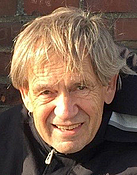Profiles of Leading Women Scientists on AcademiaNet.
Members
List of Members | Expert Search
Search among the members of the Leopoldina for experts in specific fields or research topics.

Image: Private Source
Gerhard Wagner
| Year of election: | 2005 |
| Section: | Biochemistry and Biophysics |
| City: | Chestnut Hill, MA |
| Country: | USA |
CV Gerhard Wagner - German (PDF)
Research
Research Priorities: Structure-function relationships of proteins related to T cell activation, translation initiation in eukaryotes, apoptosis, trans-membrane signalling, search for new cancer therapies
Gerhard Wagner is a German-American biophysicist and structural biologist. His work has been pathbreaking in the development of biological nuclear magnetic resonance (NMR) spectroscopy. The focus of his research lies on the structure, dynamics, and stability of proteins in relation to their function. Recently, his primary effort is on understanding, diagnosing and inhibiting human cancer.
Gerhard Wagner developed methods for sequence-specific resonance assignments, which became the basis for protein structure determination in solution. He also revealed that proteins exhibit a wide range of internal backbone and side chain motions.
With NMR techniques for protein structure determination available, Gerhard Wagner focused on specific cellular processes: Translation initiation, the process by which cells convince the ribosomes to synthesize proteins, mechanisms of T-cell activation, and transcription initiation. He reasoned that inhibiting interactions of some proteins’ interactions may have therapeutic benefits and enable development of new drugs for curing human disease, such as cancer.
When working with aggressive cancer stem cells, the Gerhard Wagner and his team discovered a new cancer-specific organelle, dubbed cytocapsular tube, which consists of a membrane-enclosed compartment that only forms around malignant tumors. This organelle allows protected cancer-cell migration (metastasis). Knowing its constituent proteins promises new ways for cancer diagnosis and therapy.
Career
- 2013 Visiting Professor, University of Melbourne, Melbourne, Australia
- 1995-1996 Visiting Professor of Basic Medical Sciences, Kansas State University, Manhattan, USA
- since 1992 Elkan Rogers Blout Professor of Biological Chemistry and Molecular Pharmacology, Harvard Medical School, Harvard University, Cambridge, USA
- since 1990 Professor of Biochemistry and Molecular Pharmacology, Harvard Medical School, Harvard University, Cambridge, USA
- 1989-1990 Professor of Biochemistry, University of Michigan, Ann Arbor, USA
- 1987-1989 Associate Professor Biochemistry, University of Michigan, Ann Arbor, USA
- 1982 Habilitation, Eidgenössische Technische Hochschule (ETH) Zurich, Zurich, Switzerland
- 1979-1982 Research Assistant, ETH Zurich, Zurich, Switzerland
- 1978-1979 Research Stay, Massachusetts Institute of Technology (MIT), Cambridge, USA
- 1977 PhD in Biophysics, ETH Zurich, Zurich, Switzerland
- 1972 Diploma in Physics, Technical University (TU) Munich, Munich, Germany
Functions
- since 2011 Member, Nominating Committee, International Society of Magnetic Resonance (ISMAR)
- 2002-2007 Member, Protein Structure Initiative Advisory Committee, National Institute of Health (NIH), USA
- 2002-2009 Associate Editor, Quarterly Reviews in Biophysics
- 2001-2015 Advisory Board, Cell
- 1995-1996 External Advisory Committee, UCLA-DOE Laboratory of Structural Biology and Molecular Medicine, University of California Los Angeles (UCLA), USA
- 1994-1997 Member, Advisory Board, Brookhaven Protein Data Bank (PDB), New York City, USA
- 1993-1997 Associate Editor, Protein Science
- 1990-1993 Associate Editor, FEBS Letters
Projects
- since 2019 Host, Project “Deciphering the molecular mechanisms of non-canonical translation orchestrating cell fate decisions”, German Research Foundation (DFG), Germany
- 2016-2021 Project “Roles of Eukaryotic Translation Initiation Factors in Gene Expression”, National Cancer Institute (NCI), National Institute of Health (NIH), USA
- 2014-2018 Project “The translation apparatus of Leishmania: from basic analysis to pursuit of novel”, National Institute of Allergy and Infectious Diseases (NIAID), NIH, USA
- 2013-2017 Project “Mechanism and inhibition of SREBP-dependent cholesterol/lipid metabolism”, National Heart, Lung, and Blood Institute (NHLBI), NIH, USA
- 2009-2011 Project “800 MHz Triple Resonance Observe (TXO) Detection CryoProbe”, National Center for Research Resources (NCRR), NIH, USA
- 2009-2011 Project “Assays for Discovery of Translation Initiation Inhibitors”, National Institute of Neurological Disorders and Stroke (NINDS), NIH, USA
- 2004-2009 Participating Scientist, Subproject “Structure studies on bacterial glutamate transporters”, Research Group (FOR) 450, DFG, Germany
Honours and Memberships
- 2018 Gunther Laukien Prize, Bruker Corporation, Billerica, USA
- 2015 Elected Member, American Academy of Arts and Sciences, USA
- 2013 Australia-Harvard Fellowship, Harvard Club of Australia, Harvard University, Cambridge, USA
- 2013 Elected Member, National Academy of Sciences, USA
- 2012 Mill Hill Lecture
- 2011 Stein and Moore Award of the Protein Society
- 2011 Agilent Thought Leader Award, Agilent Technologies Inc., Santa Clara, USA
- 2008 Elected Fellow to the International Society of Magnetic Resonance
- 2005 Elected Member, German National Academy of Sciences Leopoldina, Germany
- 2004 Achievement Award in Magnetic Resonance, Eastern Analytical Symposium (EAS) Inc. Spring Lake, USA
- 2003 The Cleveland Structural Biology Lecture
- 1999 Fellow, American Association for the Advancement of Science, USA
- 1998 The Welcome Lecture in Structural Biology, Kansas State University, Manhattan, USA
- 1992 Zurich Protein Lecture, ETH Zurich, Switzerland
- 1977 Silver Medal Award for PhD Thesis, ETH Zurich, Zurich, Switzerland
- 1970-1974 Fellowship, Studienstiftung des Deutschen Volkes, Germany

